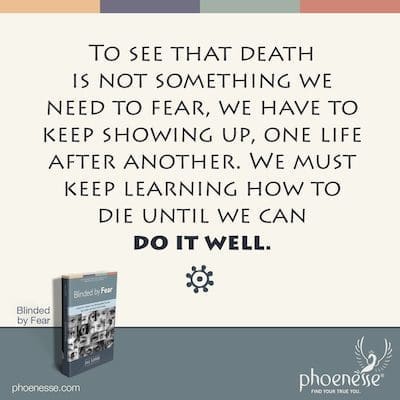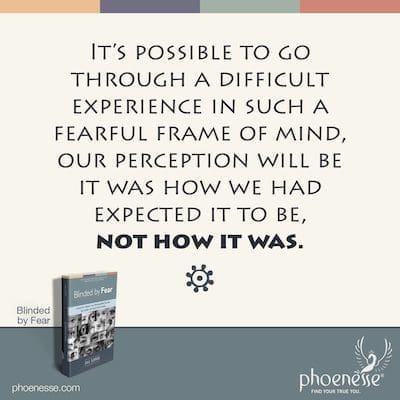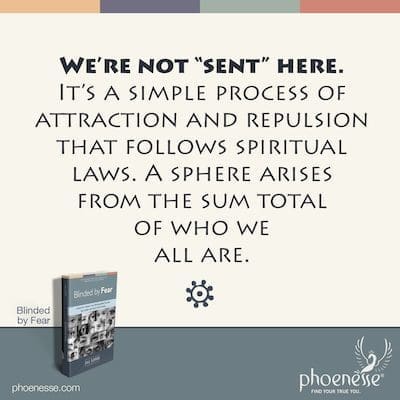If we boil it down, there are essentially two philosophies about this thing we call life, and they are apparent contradictions. One imparts the perspective that if we are truly mature, spiritually and emotionally, we need to learn to accept life on life’s terms. And often those terms are hard to take. Our best approach will be to accept what we can’t change. When we won’t accept life, this theory says, we breed anxiety and disharmony. Then our peace of mind will be destroyed by the tension this creates, and we make our situation worse. So the gauge of a mature, well-rounded personality, from this perspective, is how well we are able to accept the inevitable. Are we OK with our destiny? And how cool are we with, say, death? What’s there to fear?
The other school of thought postulates we don’t need to accept any of this unpleasantness. All this stuff about accepting hardship, including death, is totally unnecessary. Our only destiny is the one we create for ourselves. And whenever we decide, we can mold ourselves a new destiny. A better destiny. One in which we no longer suffer. Real spiritual awakening, this side says, comes with the awareness that we don’t need to accept suffering. That unfathomable abundance can be had, right here, right now.
Talk about two sides of the street! How confusing is that? But if we search for both of these perspectives, we’re likely to find them in just about any great spiritual teaching, including these from the Pathwork Guide.

At first glance, these two philosophies might appear mutually exclusive. But maybe they’re not. Can we find a common denominator that brings them together and unites them? In fact, we can: it is fear.
It’s like this. If our desire for happiness stems from our fear of unhappiness, we can never be happy. But if we want happiness just for the sake of being happy, then nothing will bar the door. It might seem small, but there’s really an enormous difference between these two approaches.
Because here’s how fear works: If we have fear, sooner or later we’re likely to experience the very thing we fear in order to rid ourselves of the fear. If, however, we are able to discover the truth behind the fear—which is of course that there is nothing to fear in the first place—then we can shed our fear without having to experience it. But alas, we are typically slow to catch on to this insight, in which case we need to cozy up to the circumstances we fear until they lose their fearful roar.
In other words, as long as we desire something positive out of fear of its opposite—the negative—our fear will keep us from attaining what’s positive. And folks, this reality is rampant here on this dualistic sphere we call home. Too often, we don’t want the good stuff for the sake of the good stuff, we want it because we hope it will make the bad stuff go away. Let’s break this down and look at some of our more popular desires.
We can start with the great whale of duality: life and death. These are really two sides of the same coin, or two facets of the same process. This means that by learning how to die—which is what it feels like when we accept something we don’t like—we will find out there wasn’t anything to fear. We’ll discover that this thing we all fear so much, death, isn’t real. There is simply no such thing as death. Furthermore, since these two are joined at the hip, if we fear death, we’ll also fear life, and vice versa.
Let’s make an additional connection regarding death. It’s impossible to love—to truly love—if we fear death. Just take a look at how humans behave. Those who live their lives with great gusto and joy are the ones who aren’t afraid of dying. But the more we shrink back due to our fear of death, the more we will be hanging onto life by our fingernails. This is not because we are enjoying life so much but because we are scared to death of, well, death. If this is us, we’re not really living at all. We’re barely hanging on.
Fear of dying, then, stops us from living. Yet it’s only by deeply living that we learn that life is one long, unending process. And dying is just a temporary illusion. In truth, clinging to life is never going to bring us pleasure or a sense of meaningfulness. So these two things are also linked. The more we cling, the less we enjoy it. It’s just a matter of degree.
And since nearly no one is completely clear of their fear of death—for when that’s truly the case, we no longer have to incarnate here on this life-and-death merry-go-round—hardly anyone really and truly lives. That said, there are some who are largely free from this fear of death. Those are the ones making meaningful lives filled with pleasure.
Since all this is so hard for the average person to sort out on their own—to see that death is not something we need to fear—we have to keep showing up over and over, one life after another. We must keep learning how to die until we can do it well. Until one day we get it: dying doesn’t frighten us. Glory be, that’s the day we arrive at life eternal, but not a day sooner. For as long as we fear death, we have to keep going through it.
Fear and control
Another way we miss the mark in life is by always wishing to be in control. As a result, we perpetually fear being out of control. But don’t all great spiritual teachings tell us that death is an illusion and that we’re masters of our own universe? That we, and we alone, control our destiny? Many of us strive mightily for this goal. But we’ll never get there if, under the water, we’re backpedaling like crazy out of fear we’re going to lose control.
We need to learn to flexibly adjust, and to loosen our grip on things. We must learn to dance between steering our own ship through the rivers of life and being able to let go of the wheel. It’s a fine balance. And the more we fear letting go, the greater will be our inner imbalance. With our soul movements out of sync, we’ll lose any hope of controlling our final destiny.
So then what do we do? We grab for pseudo-control. But this of course adds more tension and anxiety to the pot. It scuttles any chance we had at peace and tanks our self-confidence, torpedoing our confidence in life in the process. The only way out—the way for real confidence to grow—is to give ourselves over to the unknown. We have to give up our tight holding on. If we will do this—if we will let go—we will discover something wonderful: full mastery of life without any fear of losing control. In short, we’ll finally understand that there was never anything to fear.
To be fair, the typical person isn’t yet capable of having total, immediate control of themselves or their lives. We still have to accept, at least for a time, that we have limitations. And these limitations within ourselves are going to create an undesirable destiny for us. Denying that this is the case—that we have limitations due to our own not-yet-healed imperfections—is a sure sign that we still have fear. And our denial, coming from our outer will, is only going to make matters worse.
To accept, on the other hand, our temporary limitations and their associated consequences, doesn’t mean we resign ourselves to a life of tragedy and suffering. No, acceptance simply means we realize we’re going through a rough patch that’s uncomfortable, and we’re willing to take responsibility for this state. Sure, there won’t be much expanding going on for a time, and bliss won’t be happening, but we don’t need to dread this. This too shall pass. An attitude like this is what will open the door further, rather than slam it shut and leave us in the dark.
Our aim is to be in control of our own destiny. And if the potential to give over and trust the greater forces of life didn’t exist somewhere inside us, we could never get there. We can at least trust that such a potential exists in us. This is a place to start. For in the end, it’s our fear and distrust that causes us to hang on, refusing to relinquish control. And this is what’s blocking us from freedom and bliss: our own fear and distrust.
Reaching our destiny
Another aim of ours is for pleasure. This is deeply inborn in us, just as our desire for control over our own life is an inherent part of our human instincts. Our psyche knows instinctively that both of these are our birthright. They are both our destiny and our origin, and we want them back.
But here’s the thing. If we desire pleasure because we want to run away from pain, pleasure will elude us. But the absence of pleasure is not some big abyss of darkness. And so we don’t need to shrink away from it. If we can understand this, we won’t let our fear of pain steer us in the wrong direction.
This principle guides every aspect of living:
a) If we fear being sick, we prevent being healthy.
b) If we fear growing old, we prevent eternal youth.
c) If we fear poverty, we prevent abundance.
d) If we fear loneliness, we prevent true companionship.
e) If we fear companionship, we prevent self-containment.
We could keep going. In every instance, the great enemy is fear. And the best way to conquer this formidable opponent is to start by admitting it’s there. Just giving it voice will take a lot of the wind out of its sails. Articulating our fears will also open new doors for ousting this unpleasant guest.
It’s always important that we formulate our desires, expressing them clearly in our thoughts and our intentions. This is going to be difficult, though, if we let our fear of our fear take us down. So calm admission and a willingness to accept, for now, that this is what’s here will carry us further in eliminating our fears than trying to fight them.
Recall that the three main stumbling blocks in any human soul are pride, self-will and fear. But the more unified we become, the better we’ll be able to reach the place in any inner division where things come together. Like with this triad, for example. Once we rid ourselves of fear, it will become quite easy to get past our pride and self-will. When we’re no longer afraid of having our dignity pulled out from under us, we won’t keep standing on the unstable ground of false pride. And once we’re no longer afraid that either life or someone else is going to try to control us, we’ll readily let go of our self-will.
Fear is the great locked door. It’s what stops us from having access to all that could be available to us—right here, right now—the minute we uproot our fear from our heart and from our soul.
When it comes down to it, friends, this is the name of the game. This right here is what this whole school of life, with all its many repeated incarnations, is all about. And it’s what this spiritual path is trying to teach us: fear is unnecessary.
Often, we hear the message but we get the meaning wrong. For instance, when we’re told that we must learn to accept, what do we think? That we must accept that life is one long road of deprivation and suffering. When we hear that we must learn to let go of control? We think this means we have to release ourselves into a giant abyss of pain and hardship. Such misconceptions only increase our fear, and inflame our stubbornness and tense reluctance. We become more rigid, shrinking from freedom and pleasure.
But what’s the truth of the matter? Acceptance must help us see that our destiny is to have whatever we most desire. Giving up control of our little ego-bound self-will, in the end, will show us that we can release ourselves into a new freedom. We can let go into something that’s what we truly want. So there’s no need to keep fearfully holding on.

Passing through fear
When we finally become convinced of this truth that there is nothing to fear, acceptance won’t seem like such a big deal. For it’s not really a risk to accept and embrace the whole universe once we realize that it’s perfectly safe. At that point, it will no longer be about going through fear in order to rise above it. Then we will be ready to enjoy all the fulfillment and abundance, pleasure and bliss that living an eternal life of freedom entails. When we get past our fears, then everything our little human heart desires can be ours.
This truth is what our spirit has been waiting for. For this is the truth that will set us free. And when we see it—can truly take it in—it will be like: “How did I not see this before? Why did I put myself through so much unnecessary hardship?” And then we’ll walk right out of the prison we’ve been living in. The world will now be ours.
If we’re not ready yet, then we still need to learn some things. Like, that really, there’s nothing to fear. But the only way to learn this lesson is by living in a world full of ignorance. It’s by involving ourselves in this ignorance—by ignoring the truth that there is nothing to fear—that we will break through the clouds. We need to discover this truth for ourselves: Even what hurts is never quite what we fear.
For haven’t we all had the experience of anticipating some particular event, and then, after we went through it, we realized it wasn’t half as bad as we feared it would be? This experience offers us an important fact. The worst part of fear—it’s main attraction—isn’t the undesirable thing we fear itself, but the unknown quality of it.
Now, for sure, it’s possible to fear something we’ve already experienced. But whenever we experience something while in a state of fear, all our faculties have been dulled. The truth of the experience, then, can’t fully be perceived or digested. Our fear is going to blur our view of things so we can’t evaluate the situation objectively. So it’s entirely possible to go through a difficult experience in such a fearful frame of mind that we come out the other side thinking the experience was somehow different from what actually happened. Our perception will be that it was how we had expected it to be, not how it was.
This is why our souls need so many repetitions before we get it right and can rid ourselves of fear. This is especially true regarding the experience of dying. We can rest assured that the trauma of being born is infinitely harder than the one of dying. Still, we collectively believe that dying is way worse. For this is what is already imprinted in our souls each time we arrive.
So when it’s time for us to transition out of this dimension, passing through the liberating event of releasing ourselves from our human bodies, this widespread belief will kick in. And it will produce such fear that we’ll be too anxious to register what really takes place. We won’t be able to die with full consciousness and appreciate the event as it happens.
So instead of meeting this unknown element and experiencing the true facts of the dying process, our smart little brains become half-anesthetized by fear and our perception becomes warped. This is why the truth can’t impress itself on our soul substance. Instead we end up with a hazy recollection. What’s more, the fragments that do register are quickly forgotten. For our memories rely on a free state of mind that’s not cluttered and fogged over by fear and misconceptions. What little we do remember is soon blotted out by the overwhelming power of that collective belief.
Frequently a dying person will register something like, “Oh my, is this what dying really is? How fantastic!” But in order for this to become the prevailing memory for this person, they will need to have been fully conscious at the time of their transition. If there’s fear, then it’s not possible to be fully conscious. But every time we pass through this sphere, there’s an opportunity for a little more truth to land. Eventually, we’ll be as relaxed about going through this transition as we are about going to sleep at night or about starting a new and as yet unknown phase in life.
Dying is produced by our fear of dying. When the fear vanishes, going through such things becomes superfluous, and it will therefore no longer need to take place. Then we’ll be done with these cycles of incarnating.

Drawn to duality
Earth is a dualistic sphere in which we must go through this experience of death. Thankfully, it’s the only one. After this, we move onto other spheres where there will be other experiences that will be equally important for the evolution of our souls. But this is the only sphere that requires us to seemingly die.
What exactly do we mean by a “sphere?” We’re talking here about a sphere of consciousness. In such a sphere, entities with a similar state of consciousness flock together, following immutable spiritual laws. Their overall state of development or consciousness can be collectively referred to as a sphere.
We’re all familiar with looking at a geographical area or material space, like a planet, from such a point of view. But from a spiritual point of view, time, space and movement are all expressions of one particular state of consciousness. Our three-dimensional minds are challenged to imagine a consciousness that has other dimensions, and that also unifies all these different dimensions into a singular, greater consciousness.
So when we talk about spiritual spheres, it’s quite possible that our minds will oversimplify them into terms of geographical areas that are located out there somewhere, in outer space. Yet it’s not, in some way, untrue that the whole physical universe with all its many spheres lives within the self. And just as each planet is a reality that exists both within and without, many other spiritual worlds or spheres exist, both within and without. This is very difficult for us to comprehend.
When we are talking about the beings who inhabit these spheres, saying they have a comparable level of overall development, we need to not take this too literally. For surely we can look around and see that there are considerable differences in the development level of people. And this is also true among those in the other spheres of consciousness. But despite their differences—with older, more developed spirits capable of perceiving and understanding more than younger spirits—they all have certain points in common. And it’s due to their similarities that they all can benefit by flocking together. This is why we’ve all been drawn together to make up this sphere on planet Earth.
To help visualize this better, consider that the conditions on Earth are a precise expression of the sum of the consciousnesses of everyone living here, plus of the individuals who aren’t incarnated right now but will be coming back again. All the beauty we see in nature and that has been created by women and men is an expression of our inner qualities that are in harmony with the universe. By the same token, all the strife we see—including poverty and wars, sickness and dying—are an expression of our confusions and the destructive emotions we are clinging to.
So all our conditions, whether great or petty, favorable or unfavorable, are a direct result of the people who come here. And we can call all of this a sphere of consciousness. If, in another sphere, the overall level of consciousness is higher than here, conditions there will be more harmonious and less difficult. In a sphere where the spirits inhabiting it can perceive a higher level of truth, it’s unavoidable that the circumstances in that sphere will be less limiting.
Great, so how soon can we go there? Well, until we have learned how to overcome the errors and disharmony we’re facing here, we’ll have to keep coming back to this sphere. Until we are capable of perceiving a higher level of truth, we just can’t get there from here. For our outer environment and our inner state of consciousness must be a match. It can’t be otherwise.
We’re not “sent” here. No one “commanded” us to come here. It’s a simple process of attraction and repulsion that follows spiritual laws. These laws work exactly the same as the laws of chemical bonds. So it’s not correct to think that first a sphere exists, and then we are placed into it. It works the other way around. A sphere results from our thinking, our feeling, and our attitudes; it arises from the sum total of who we all are.
As such, our sphere expresses us. If we were to start expressing different qualities—like compassion, forgiveness, generosity and the like—we would no longer be drawn to this sphere, but instead we’d get to go to where the majority of beings are also expressing those qualities. But for now, we’re all here.
Transcending duality
In our minds, we human beings tend to draw an arbitrary hard and fast line between the physical and non-physical. But we humans are made up of lots of layers, and each layer is comprised of matter that has its own unique density. So then the higher the consciousness of a being, the finer will be the consistency of the matter that being is made up of. But that doesn’t mean such a being lacks form or is any less real than a human being.
It’s our beliefs that draw us to a sphere like Earth where matter is more physical, or dense. Other spheres have a finer vibration. If our entire thinking is geared toward being very superficial and materialistic, bringing us to this plane, the matter we produce for our vehicle—our body—will vibrate accordingly. In other words, the more ignorance we hold onto, with our errors, misconceptions, prejudices, limitations and darkness, the denser will be our matter, and the greater will be our suffering.
When it dawns on us that our Real Self is more than just our body, our perception of things widens. This shift allows the matter of our whole being—our entire soul—to become much finer and therefore more sensitive to the truth. We’ll have a greater sense of reality.
And so it’s super important that as we go along on our spiritual path, we find where we fear something negative, causing us to grasp for something positive. When we find these pockets of fear, and we see how we have a negative motivation for wanting something positive, we’ll hold the key in our hand for setting ourselves free from this dualistic dimension.
Having the realization, “I am not able to step into freedom because I don’t want freedom for itself, I want it because I fear being imprisoned,” will bring us closer to liberation. Then, with our heads held high, we’ll be able to accept all the rich abundance of life, as a free human being. It’s this very soul movement that makes all the difference in the world.
As we’ve already discussed, it’s our fear of death that gets us a return ticket to this particular sphere. But if we’re afraid of dying, there must be other miscellaneous errors in our soul as well. Because everything is interconnected. Any time we have a fear that constricts us, we aren’t going to be capable of merging with the cosmic stream of life that wants to wrap us in its arms and carry us along for a gentle, glorious ride.
In our tight holding, we will struggle against this cosmic force like it’s our enemy. But the only enemy here is sitting inside us. And this enemy only exists because of our false fears, our wrong conclusions about life, and the limits we unnecessarily create for ourselves. Its these limitations that cause us to turn around and attack ourselves. We do this in spite of the part of ourselves that wants to claim our birthright and become fulfilled. This other part is actually striving to go in the other direction, heading directly toward pain and misery.
We falsely believe that it’s impossible to avoid some great danger, and somehow it seems less threatening to just quickly bring it about ourselves. At least then, we think, the “great danger” will no longer be unknown. But chomping down on an entirely avoidable negative experience is going to have a very bitter taste. For any time we court a negative experience out of fear and error, it will be much harder to bear than if such a negative experience surfaced organically due to our still lingering limitations.
It makes no sense for us to rush into danger voluntarily. But it may be very hard to see that we are doing this. For it takes deep insight into the mechanics of how our inner world operates to discover this mechanism at play. Only through such insight, though, will it be possible to stop repeating this destructive game.
There is a natural rhythm to our lives that we must learn to stop disturbing by struggling against, rushing into or forging blindly ahead. Then we can blend in with the great cosmic powers with which we can create. By guiding these powers using all of our conscious selves, we truly can become masters of the universe.
“Blessings for every one of you, my friends. May these words lift your spirit and bring you nearer to the light of truth, to the reality of love, to the unending bliss of spiritual existence. Be in peace, be in God!”
–The Pathwork Guide
Ways to learn more
Next Chapter
Return to Blinded by Fear Contents
Read Original Pathwork Lecture #130: Finding True Abundance by Going Through Your Fear



